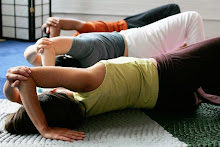Maybe you saw this blog and video from the MD Anderson Cancer Center last week:
The accompanying article on the CancerWise blog appears here.
Perhaps you also saw this "rebuttal" in the blogosphere, in which the author condemns the Feldenkrais Method as quackery. You can read MD Anderson's official response in comment number 92, and mine in number 108. Oh, well. I guess you can't expect that everyone will like you.
To point out the obvious, neither the blog nor the video make a health claim that the Feldenkrais Method cures anything. It says that the Feldenkrais Method may be helpful for patients dealing with treatment-related side-effects. That statement is based on the survey responses of class participants.
Apparently, the offending sentence in the CancerWise blog, which I contributed, was " his [Feldenkrais's] findings have been confirmed by research in neuroscience." I should have been more careful. I wanted to be concise, writing for a popular and interested audience.
While I'm not going to worry about Dr. Very-Righteous-and-Indignant-and-Doesn't-Use-His-Name, I feel an obligation to be clear to you, my regular readers. As you know (or can easily find out by reading the sidebar to this blog), I am not a scientist, nor am I a researcher. I am a teacher, and an observer and "reflect-er" on the human condition. I am also a curious and inquisitive person. Many people -- including some with education and pedigrees in the hard sciences -- are intrigued enough by the results or effects of the Feldenkrais Method that they have asked, "Why should this be so? What could explain this phenomenon?" This curiosity and willingness to explore the unknown is the beginning of all scientific inquiry.
There's not a lot of research -- yet. There are, however, over 30 published studies that speak to the issue of whether or not the Feldenkrais Method actually can and does work for individuals with specific concerns. The most complete listing I know of appears on the web site of the International Feldenkrais Federation. In my statement on the CancerWise blog, I should also have credited some of the recent, research-based popular books on neuroscience (The Brain That Changes Itself by Norman Doidge, for example), where it is easy to "connect the dots" or perhaps weave together strands that connect to the findings and writings of Moshe Feldenkrais. When my colleagues and I read of new research in neuroplasticity, learning, and the apparent link between movement and brain development, we cheer. And, we go looking for research partners to help us "build the bridge" and bring the ideas of the Feldenkrais Method to more widespread public awareness. Dr. Doidge has listed numerous studies and articles in the "Notes and Resources" chapter of his book, so I will not list them here. None of them specifically mentions the Feldenkrais Method. As my colleague, Ryan Nagy, points out, that fact is meaningless. All the studies, and the work of Moshe Feldenkrais, point to the same thing. No room to elaborate on that on the CancerWise blog!
I am certain that within the next five to ten years, there will be more solid research to prove the effectiveness of the Feldenkrais Method. Until then, what are people to do?
Well, I hope you'll continue to come to Feldenkrais classes and lessons. You are reading this blog, and so I am preaching to the choir here. You are already curious. You have already experienced something of the Feldenkrais Method, or are thinking about coming to a class or to lessons. Typically, you are someone who would like to have choices in how you deal with difficulties, with roads of inquiry leading away from surgery or drugs, if possible. You're willing to try something different.
Since I don't have a medical background, I am careful not to identify myself as a "healer." I don't give treatments, or adjustments, or therapies, or follow protocols. I teach people, and lessons, in that order. I engage with people at the level of whatever it is that they would like to learn about themselves, and how they do things, and how they might have things more the way they want them to be. I see improvements big and small every day in each of my clients. I don't know how to quantify it. Maybe somebody does. I'm more interested in the individual case, the outlier, than in the big-picture, one-size-fits-all, broad brush approach. That's why I do the work I do.
Quantitative and qualitative measures are different types of data, and each is suited for particular purposes. You don't demand that every job be done with a screwdriver when a wrench will do the trick for some. So -- there's some quantitative data on the effectiveness of the Feldenkrais Method, and we'd love to have more. We have more qualitative data, and we'd love to have more. Until then, we trust you to do your own "research." In our method, intellectual rigor and non-judgment walk hand in hand. Come to a class where your experience and your perceptions are important. Come to a class where you can prove to yourself that change is possible. If you need to have some hard data before you come, we'll give you what we've got. However, you'll probably be waiting awhile. If you're willing to come and make up your own mind, we're ready for you, right now.

![Reblog this post [with Zemanta]](http://img.zemanta.com/reblog_e.png?x-id=4c4e98e0-da03-4a84-93a9-a1333be1ef2f)


No comments:
Post a Comment